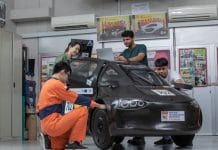In 2021, the Minister of Environment and Water in Malaysia announced that starting from January, every last Saturday of the month would be the national e-waste collection day. According to the 2020 Global E-Waste Monitor Report prepared by the United Nations University, 364,000 tonnes of e-waste were generated in Malaysia in 2019. This includes both industrial e-waste and household e-waste. The Department of Environment (DOE) statistics indicate a collection of 2459 tonnes of household e-waste in Malaysia in 2021. Personal electronic devices or household e-waste items such as mobile phones, laptops, and televisions were mentioned as the top contributors to the collected e-waste fraction that year. While the improvement was a step in the right direction, we still need more concentrated efforts for public awareness of e-waste management and proper disposal protocols in Malaysia, especially for the household e-waste fraction.
The legislative frameworks in Malaysia identify e-waste as a scheduled waste, and the scheduled waste code is SW110. In addition, the existing legislative frameworks address the collection, storage, transport, recycling and disposal of industrial e-waste. There are several partial and full e-waste recycling facilities to handle this fraction. However, no such legislative frameworks (regulations were drafted) on household e-waste in Malaysia, resulting in the country’s informal waste e-waste management and value recovery sector.
Ongoing debates exist on the positive and negative aspects of the informal e-waste management sector in Malaysia. Based on my observations, there are multiple opportunities for informal waste collectors to benefit from the trade. Due to the lack of household e-waste disposal protocols and the segregation of general waste, several informal waste collectors are in Malaysia. The public tends to drop e-waste at public locations such as roadsides and public property, leaving the e-waste unattended and providing a business opportunity for informal waste collectors to operate. Collectors would use a modified bike or bicycle to collect discarded waste materials, both e-waste and recyclable materials, such as soft drink cans, bottles, cardboard, and plastic items. There are also niche waste collectors who have a value perception of e-waste and search for materials such as scrap metal to sell in the e-waste transaction trade for upcycling purposes (if not, the improperly discarded e-waste fraction would end up in landfills, which is not recommended as well). In addition, it is understood that scrap metal collectors supply e-waste fractions to informal and formal e-waste recyclers.
In addition to informal e-waste collectors, in more urban areas such as Kuala Lumpur, artisanal e-waste recyclers also participate in informal e-waste dismantling and value recovery activities. These informal e-waste dismantling processes are mainly limited to easily recoverable items, such as copper from electric cables and transformers. The typical copper selling price (to a middle player) is RM 20/kg or USD 5/kg, which is lower than the copper trading price by licensed businesses in Malaysia. Cheaper costs with little to no overhead, such as rent and less technical knowledge requirements drive these informal operations. These observations also suggest that some people still return their e-waste to informal e-waste collectors (i.e. informal e-waste recyclers mean informal e-waste supply chains).
While these smaller businesses contribute to reducing e-waste accumulation without purpose, I do not recommend informal dismantling and recycling activities as they may create significant occupational health and safety risks. Due to the increase in informal e-waste management and recycling systems, fewer e-waste supply chains exist for registered partial and full recycling facilities. Due to the private nature of these business operations, there is less transparency as to the informal e-waste recyclers’ supply chains, therefore, creating potential environmental issues such as the mishandling of plastic fractions and the final solid residue of e-waste dismantling operations.
Although aware of informal e-waste recycling operations, people who dispose of household waste do not understand the issues related to informal e-waste recycling operations. Value perception of household e-waste drives informal e-waste dismantlers, and thus legislative frameworks are required to manage household e-waste efficiently in Malaysia.
It would be preferable to register informal waste collectors who use a modified vehicle to collect e-waste (not the informal e-waste dismantlers) under local government bodies considering their efficient waste-collecting services to a circular economy. An extended producer responsibility (EPR – electrical and electronic equipment producers take responsibility for collecting their distributed equipment, while consumers may be responsible by paying a recycling fee once consumer electronics are purchased) model is suggested for India, considering the country’s extensive informal e-waste collection business and a similar, perhaps even modified framework would work for most of Southeast Asia. I believe further research studies are required to understand and improve the operational characteristics of informal waste collectors and e-waste dismantlers.
By Dr. Saman Ilankoon, School of Engineering









